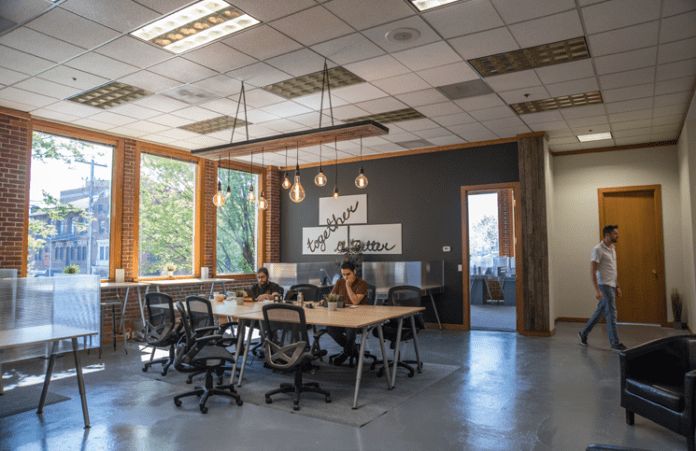We’ve all seen the commercial of a person typing away on a laptop lounging on a sandy beach with a turquoise water view and an umbrella drink on a table close by. The only thing missing from this picture is reality – and high speed connectivity and reliable cell service.
So, the self-employed are actually found in home offices, coffee shops and libraries. For some, this works. For others, home provides distractions and a feeling of isolation while coffee shops and libraries give a greater sense of community but no actual networking or collaborative opportunities.
Other options do exist for entrepreneurs not ready or desiring to lease a full-fledged office, such as co-working spaces.
“Until this year, Vancouver was the only city in Washington with more than 100,000 people that had no co-working or incubator space,” said Teresa Brum, the city of Vancouver’s economic development manager. “But we now have three in Vancouver, and there is a growing demand for more co-working space.”
Co-working spaces offer the best of dedicated services and the flexibility of low monthly costs into one concept. Utilities, a professional mailing address, use of conference rooms and a quiet place to meet clients are all basic features of most co-working spaces.
Max Mikhaylenko, co-founder of Columbia Collective in downtown Vancouver said, “Co-working as a concept became popular because of remote working technology. Our members are freelancers, start-ups, tech companies, remote workers. When working at home is no longer an option, they don’t have to sign a three year lease and [can] have a business location for as low as $175 a month.”
That can range from a shared desk to a dedicated one and with 24/7 access, as well. Over and above the basics, Columbia Collective also provides printing services, a kitchen, lounges, storage, complimentary gourmet coffee and networking events.
Since opening in March, Columbia has grown to 30 members and sees their goal of 100 as realistic. Mikhaylenko pointed out that being part of a community, in-house referrals are an organic, routine occurrence. Since a variety of professions exist within the membership base, a blogger may need website help or a photographer may be seeking an accountant. Once those people work together, it’s natural to continue referring to their respective clients.
Community is what defines co-working spaces, according to Mikhaylenko; it’s the professional connections, someone to bounce ideas off of, collaborate on projects together and have a sense of accountability. An added benefit of Columbia’s downtown location is social connectedness via breweries, coffee shops and restaurants in walking distance to the space.
Geared toward tech
If there is one specific community that’s a perfect fit for local co-working spaces, Mikhaylenko said, it’s the tech industry.
“Those who most naturally gravitate to us are people who can rely on technology to work remotely. We’re more geared toward the tech scene so developers, graphic designers and also people who are employed by large companies out of San Francisco – and they (Bay Area companies) are willing to pay for their (remote employee) office space here because they can do their work as efficiently and less expensive,” he said.
This last spring, WSU-Vancouver Hospitality Business Management capstone students conducted a study among Vancouver businesses and business people to determine interest in co-working space, and their results concur with Mikhaylenko’s experience.
“The Portland/Vancouver area is especially popular for tech industries because of the nature of most start-up businesses [here] and the IPZ (Innovation Partnership Zone) being focused on digital and tech companies,” said Iis Tussyadiah, associate clinical professor at the School of Hospitality Business Management WSU-V.
Tussyadiah noted that the increased demand for co-working space may be fueled by millennials who desire greater control of job performance and when/where they can be more productive. She said the social and professional connections appear to improve productivity among workers and the flow of information is not isolated to interacting with those in similar industries. A nurturing environment over a competitive culture was another characteristic that drew people to co-working spaces, the study found.
The capstone students also discovered, as Mikhaylenko noted, that many companies are now using co-working spaces to facilitate employees who are traveling.
The WSU-V findings were reported to the city of Vancouver. The city is using the information to further refine their marketing of co-working spaces to the tech community.
“As older downtowns evolve from retail-based economies to service-based economies, there is a growing need for space that can accommodate this changing type of work,” Brum said. “While coffee shops have served as workspace for many freelancers and creative workers, they lack the facilities that many workers need – such as conference rooms, kitchen space, printers and copiers, etcetera.”
Brum echoed the sentiments of Tussyadiah and Mikhaylenko that co-working spaces appeal, in large part, to the balance that creatives try to strike between a quiet atmosphere and an inherent need to gather in a collaborative environment.
“There’s plenty of data to back up the idea that co-working boosts productivity and innovation. In one survey, 84 percent of respondents said they were more engaged and motivated when co-working, and 67 percent said co-working improved their professional success,” Brum said.
With Portland’s popularity – and commensurate price tag – continuing to grow, Vancouver is becoming a more attractive option for co-working space. Armed with a more comprehensive look at co-working spaces in the region, the city is working along with their partners at Columbia River Economic Development Council (CREDC) to recruit more space in the downtown area and Brum is confident that the sector has a bright future in Vancouver.










